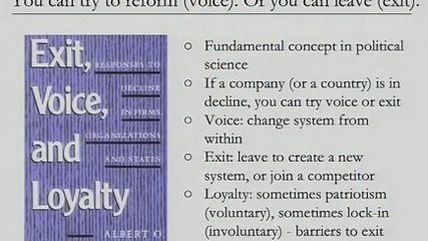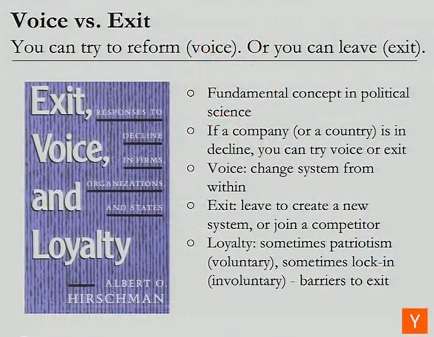Tech Should Make It Easier To Escape Government Control, Says Startup Veteran Balaji Srinivasan


"If a company or country is in decline," says Balaji Srinivasan of Stanford University and genomics startup, Counsyl, "you can try voice or you can try exit." Speaking at this year's Startup School, sponsored by tech "seed accelerator" Y Combinator, Srinivasan talked up the liberating and enriching effect technology has had on the world, and the backlash it's facing from what he referred to as the "paper belt" of old-line power centers. Silicon Valley—technology innovators in general—can and should use their voice to argue back, he says, but ultimately must be prepared to exit the system in a way that doesn't prevent fans of the old paper belt from enjoying the system they already have.
Echoing a 1970 book by Albert O. Hirschman, Srinivasan says "voice" involves changing the system from within, while "exit" is "leaving to create a new system, a new startup, or to join a competitor, sometimes." Voice in the context of a country, he says, is voting, while exit is, classically, emigration. Beyond that, though, and of relevance to his technically savvy and entrepreneurial audience, exit means "giving people the tools to reduce the influence of bad policies over their lives without getting involved in politics; the tools to peacefully opt out."
America has been shaped by both voice and exit, says Srinivasan, both in terms of people coming here from elsewhere, and people migrating internally, state to state and company to company, to escape rules, structures, and bureacracies they disliked. "Exit amplifies voice," he adds. When people see others fleeing what they like, it emphasizes the value those others place on competing choices. For that reason, "a crucial additional feature for democracy is to reduce the barrier to exit" because "voice gets much more attention when people are leaving in droves."
"I believe the ability to reduce the importance of decisions made in D.C., in particular, without lobbying or sloganeering, is actually going to become extremely important over the next ten years," he says. The startup veteran and academic emphasizes that he uses "D.C." as a euphemism for political authority at all levels that people might want to escape and that isn't so eager to be evaded.
Srinivasan references Google CEO Larry Page's recent call to "set aside a part of the world" for unregulated experimentation, and venture capitalist Marc Andreessen's prediction of rapid creation of new countries in the years to come. But those new spaces don't have to be location-based, he argues. 3D printing will make it impossible to ban physical objects. Virtual currencies like Bitcoin can render capital controls unenforceable and put stored wealth beyond the reach of the state. Telepresence and remotely controlled robots will allow people to "be" anywhere without physically crossing a border.
And the new generation of tech innovators have a role to play in continuing to break down barriers to exit by producing tools that free people from political and legal controls. What he's calling for, ultimately, is a form of internal secession defined in extent and form by those seeking exit, and served and empowered as a market opportunity or series of opportunities by entrepreneurs. This isn't a new option—Hirschman wrote about it decades ago and anybody drinking at a speakeasy in 1925 lived it—but it's an option that Srinivasan sees becoming much more powerful and available in the years to come.
There may never be an app for freedom, but technology promises to make freedom a lot more accessible, and its enemies relatively weaker, than in the past.


Show Comments (10)